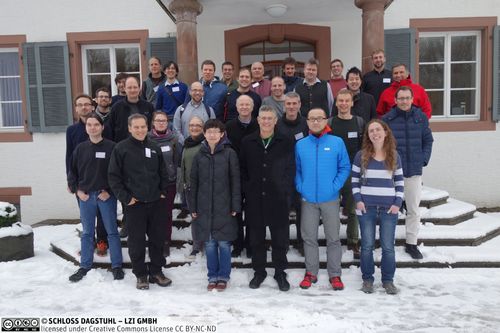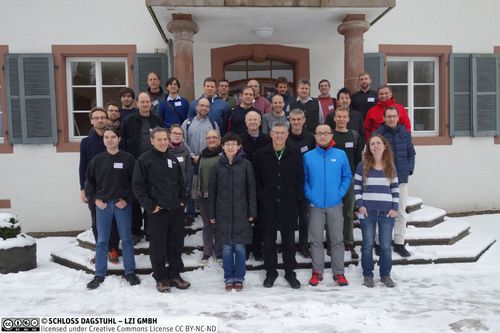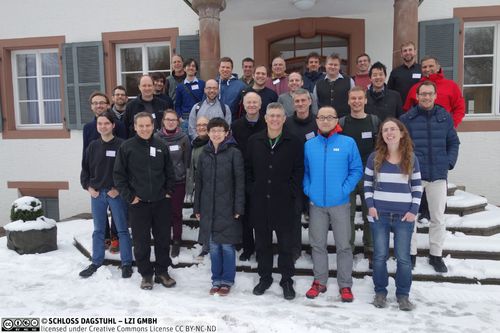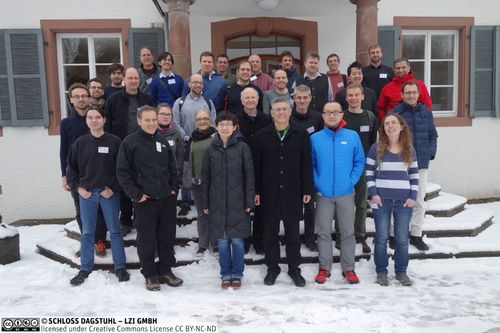Dagstuhl Seminar 17021
Functoriality in Geometric Data
( Jan 08 – Jan 13, 2017 )
Permalink
Organizers
- Mirela Ben-Chen (Technion - Haifa, IL)
- Frédéric Chazal (INRIA Saclay - Palaiseau, FR)
- Leonidas J. Guibas (Stanford University, US)
- Maks Ovsjanikov (Ecole Polytechnique - Palaiseau, FR)
Contact
- Andreas Dolzmann (for scientific matters)
- Susanne Bach-Bernhard (for administrative matters)
Schedule
This Dagstuhl Seminar aims to bring together researchers interested in the questions of similarity and correspondence across geometric data sets, including collections of images, 3D shapes, GPS traces and other types of data with geometric flavor. A recent trend, emerging independently in multiple theoretical and applied communities, is to understand networks of geometric data sets through their relations and interconnections, a point of view that can be broadly described as exploiting the functoriality of data, which has a long tradition associated with it in mathematics. Functoriality, in its broadest form, is the notion that in dealing with any kind of mathematical object, it is at least as important to understand the transformations or relations exhibited by the object or the family of objects to which it belongs, as it is to study the object itself.
Perhaps the clearest example of functoriality in analyzing and processing geometric data sets is the use of symmetries or self-similarities and self-maps for both gaining insight into the structure of the object and into its relation with other objects. Remarkably, many applied fields dealing with geometric data, including Computer Vision, Computer Graphics, and Computational Geometry have dedicated a significant amount of effort to extract and exploit self-similarity in data analysis. However, so far there has been very little interaction between the different communities and their use of these ideas, which is both surprising and unfortunate because the techniques that are developed have many points in common.
In this context, the organizers of the seminar hope to help bridge the large gaps that currently exist between various (especially applied and theoretic) fields that employ various notions of functoriality in geometric data analysis. The overall objective of this Dagstuhl Seminar, therefore, is to assemble experts in different fields that have considered similar ideas in the past and exchange their expertise, as well as provide a fertile ground for spawning new ideas and exciting future research directions.
Topics of interest in this seminar will include:
- Defining and quantifying similarity measures for pairs and collections of images, 3D shapes, and other geometric data sets
- Extracting shared structure from large geometric data collections
- Representing and computing maps and correspondences between related data sets
- Defining and computing various geometric and topological invariants for geometric data comparison
- Automatically discovering relevant features for geometric data comparison.
- Abstracting, summarizing, and correcting errors in geometric data collections
 Mirela Ben-Chen, Frédéric Chazal, Leonidas J. Guibas, and Maks Ovsjanikov
Mirela Ben-Chen, Frédéric Chazal, Leonidas J. Guibas, and Maks Ovsjanikov
Across science, engineering, medicine and business we face a deluge of data coming from sensors, from simulations, or from the activities of myriads of individuals on the Internet. The data often has a geometric character, as is the case with 1D GPS traces, 2D images, 3D scans, and so on. Furthermore, the data sets we collect are frequently highly correlated, reflecting information about the same or similar entities in the world, or echoing semantically important repetitions/symmetries or hierarchical structures common to both man-made and natural objects.
A recent trend, emerging independently in multiple theoretical and applied communities is to understand geometric data sets through their relations and interconnections, a point of view that can be broadly described as exploiting the functoriality of data, which has a long tradition associated with it in mathematics. Functoriality, in its broadest form, is the notion that in dealing with any kind of mathematical object, it is at least as important to understand the transformations or symmetries possessed by the object or the family of objects to which it belongs, as it is to study the object itself. This general idea been successfully applied in a large variety of fields, both theoretical and practical, often leading to deep insights into the structure of various objects as well as to elegant and efficient methods in various application domains, including computational geometry, computer vision and computer graphics.
This seminar brought together researchers and practitioners interested in notions of similarity, correspondence and, more generally, relations across geometric data sets. Mathematical and computational tools for the construction, analysis, and exploitation of such relational networks were the central focus of this seminar.
 Mirela Ben-Chen, Frédéric Chazal, Leonidas J. Guibas, and Maks Ovsjanikov
Mirela Ben-Chen, Frédéric Chazal, Leonidas J. Guibas, and Maks Ovsjanikov
- Dror Aiger (Google Israel - Tel-Aviv, IL) [dblp]
- Annamaria Amenta (University of California - Davis, US) [dblp]
- Mirela Ben-Chen (Technion - Haifa, IL) [dblp]
- Benjamin Berkels (RWTH Aachen, DE) [dblp]
- Alex M. Bronstein (Technion - Haifa, IL) [dblp]
- Michael M. Bronstein (University of Lugano, CH) [dblp]
- Antonin Chambolle (Ecole Polytechnique - Palaiseau, FR) [dblp]
- Frédéric Chazal (INRIA Saclay - Palaiseau, FR) [dblp]
- Marco Cuturi (CREST - Malakoff, FR) [dblp]
- Jie Gao (Stony Brook University, US) [dblp]
- Franck Hétroy-Wheeler (INRIA - Grenoble, FR) [dblp]
- Klaus Hildebrandt (TU Delft, NL) [dblp]
- Vladimir G. Kim (Adobe Systems Inc. - Seattle, US) [dblp]
- Ron Kimmel (Technion - Haifa, IL) [dblp]
- Zorah Lähner (TU München, DE) [dblp]
- Wilmot Li (Adobe Systems Inc. - Seattle, US) [dblp]
- Or Litany (Tel Aviv University, IL) [dblp]
- Mauro Maggioni (Johns Hopkins University - Baltimore, US) [dblp]
- Konstantin Mischaikow (Rutgers University - Piscataway, US) [dblp]
- Maks Ovsjanikov (Ecole Polytechnique - Palaiseau, FR) [dblp]
- Helmut Pottmann (TU Wien, AT) [dblp]
- Emanuele Rodolà (University of Lugano, CH) [dblp]
- Martin Rumpf (Universität Bonn, DE) [dblp]
- Frank R. Schmidt (TU München, DE) [dblp]
- Ariel Shamir (The Interdisciplinary Center - Herzliya, IL) [dblp]
- Primoz Skraba (Jozef Stefan Institute - Ljubljana, SI) [dblp]
- William Smith (University of York, GB) [dblp]
- Justin Solomon (MIT - Cambridge, US) [dblp]
- Ronen Talmon (Technion - Haifa, IL) [dblp]
- Boris Thibert (Laboratoire Jean Kuntzmann - Grenoble, FR) [dblp]
- Matthias Vestner (TU München, DE) [dblp]
- Michael Wand (Universität Mainz, DE) [dblp]
- Benedikt Wirth (Universität Münster, DE) [dblp]
- Hao (Richard) Zhang (Simon Fraser University - Burnaby, CA) [dblp]
Classification
- computer graphics / computer vision
- multimedia
- optimization / scheduling
Keywords
- Computational Geometry
- Geometry Processing
- Data Analysis





 Creative Commons BY 3.0 DE
Creative Commons BY 3.0 DE
